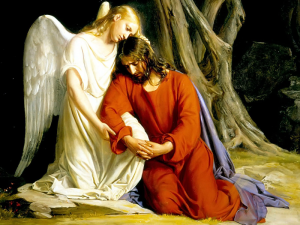Passionist Contemplative Life: Union with Christ in Surrender to the Father’s Will
- Italiano
- English
- Spanish
At the Name of Jesus, every knee must bend, in heaven, on earth, and under the earth, and every tongue proclaim to the glory of God the Father: Jesus Christ is Lord. This hymn from St. Paul’s letter to the Philippians is a familiar one to Passionists, since from the very beginning, Our Holy Founder prescribed that we begin each hour of the Divine Office with these words. I still remember my first visit to the monastery, seven years ago, when my office books were laid out for me with a narrow piece of paper on top, with the words of that verse, which I would know by heart by the end of my one-week visit.
These words are the closing of St. Paul the Apostle’s Christological hymn, which in its entirety describes the self-emptying and humiliation of Christ, who became obedient even unto death, death on a Cross, and was therefore raised up and exalted at the right hand of God the Father. Christ was obedient unto death. One aspect of our charism that is prevalent in the writings of our Founder and which I find inspiring in my own Passionist life is that of loving obedience and surrender to the Will of God.
Recalling once again my first experiences living in the monastery, as a live-in visitor, aspirant, and eventually a postulant, two things stand out vividly in my mind. First of all, when I was a postulant, I thought I knew a lot about the spiritual life, and a lot about being a Passionist (after all, I had read the articles on the website, and I had read the materials that the vocation directress and novice directress had given me, and I had read some books about saints, too). But what I came to find out very quickly was that it didn’t matter what I thought was the very best way to live Passionist life, the best way to grow in holiness, or the best way to do many other things, if my novice directress, or the superior, or the community as a whole, thought otherwise. How utterly frustrating! I was so attached to my own will, and submitting to the decisions, advice, or viewpoints of others in true religious obedience was harder than I had anticipated.
A second experience that impressed me was seeing the spirit of faith with which the sisters sought to surrender to the will of God. The words, “God’s Will be done”, or similar sayings, are common in the monastery. This struck me. I thought of God’s will in terms of His overall plan for my life, but the sisters saw God’s Will and surrendered to it in the smallest, concrete details of everyday life, and this amazed me. “What does God’s Will have to do with whether or not you get home from your doctor appointment in time for Evening Prayer?”, I would think to myself. I did not yet see or appreciate what the Sisters knew well by faith: God’s Holy Will and His providential plan guides every moment of our lives. If this attitude was impressive as manifest in the small details of daily life, it was far more so in the bigger things. I witnessed how sisters accepted heavy crosses of physical pain, difficult circumstances, demands of service to the community, difficulties and worries in their families, etc, with a spirit of trustful surrender to the plan of our loving Father. These trials and crosses were seen by the Sisters as coming from the hand of a loving Father, and were accepted with childlike trust and surrender.
I would soon come to learn that I was experiencing, and seeing lived out before me, a core principle of the spirituality of our Founder, who himself fervently lived, and exhorted others to live, in perfect obedience and loving abandonment to the Divine Will. In our own primitive rule, he calls obedience the foundation stone of religious perfection, and exhorts us to have it in our hearts and in all our actions (no. 25). Over and over again in his letters, he returns to the theme of abandonment to God’s Will: “Sustain yourself with the holy will of God”… “Say frequently from your heart, ‘O Holy Will of God, I love thee!’”… “The Divine Will is the balm which heals every wound”… “May the Will of God be done, and may the Lord be forever blessed.” He recalls the example of Jesus, repeatedly emphasizing Christ’s words that His food was to do the Will of the Father. Paul of the Cross, aflame with love for God and for Jesus Crucified, manifested his burning love, and his complete trust in God’s goodness, through eager obedience and surrender to the Divine Will, just as Christ’s filial love and trust in His Father motivated his obedience unto death.
As I continued my postulancy, with the help of our Founder, the good example of the Sisters, and of course, the example of Christ, I, too, began to see and love the Divine Will more and more. I began to experience obedience as a joyful expression of love, love that always thinks of the Beloved, always does what pleases Him, and receives everything from Him as a gift of love.
This loving obedience is so important for us as Passionists. Aware of our Baptismal configuration to Christ, as well as that deeper union with Christ effected by our religious consecration, we, like Christ, live with our gaze fixed on the Father, Whose loving plan guides every moment of our lives.

The guiding hand of the Father is manifest in many ways, some very concrete: through Our Passionist Rule and Constitutions, our Horarium, our Superiors, and the teachings and dictates of Mother Church. In our personal lives and in the lives of individual communities, the plan of the Father unfolds for each of us in the crosses and joys, challenges, sorrows, and opportunities that are unique to each community and to each individual. Still deeper, in each of our souls, the indwelling Spirit guides, moves, and prompts us to fidelity and generosity, and to growth in love, virtue, and interior prayer.
Each of these is a manifestation of the Will of our Father. The Will of the Father is for us, as it was for Christ, our personal Passion. By giving our resounding and persevering Fiat to the Father’s Will, as Mary did and as Christ did, we are surrendering our lives to the Spirit, so that Christ may renew His passion in us (Constitutions no. 13). Our Constitutions remind us that the whole life of Jesus…was one of obedience and service (no. 32). Through our lives of obedient surrender to the Father’s will we are united to Christ our Spouse, and share in His work of Redemption. As Christ’s obedience was life-giving for the sinful world, so our obedience, united to His, is a channel of redeeming grace and life into a world where defiance of God’s sovereignty, rejection of His commands, and disregard for the teaching of His Church are the cause of so much suffering and evil. United to Christ, one “Fiat” opens channels of grace to many hearts!
As we pray the closing words of the Philippians hymn, we are reminded again and again of the Death-Resurrection mystery which is our life. We are reminded that each act of obedience in union with Christ, each moment of surrender into the hands of the Father, is a mystical dying which brings forth life in our own souls, in our Congregation, and in the world. Through our faithful and generous living as daughters of the Father, Christ’s victory and His Kingdom is extended throughout the world.

